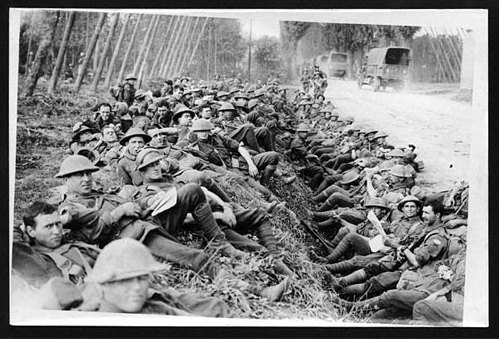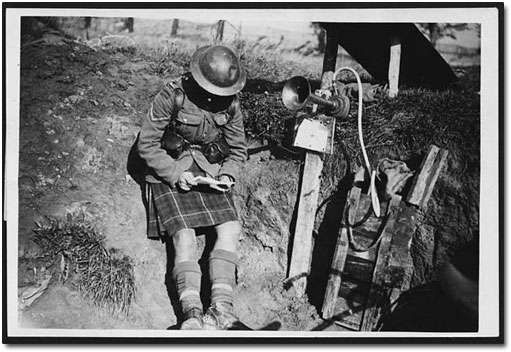6 Reading and World War I
By Edmund King
World War I could easily be described as ‘the first great war of words’. When primary schooling was made compulsory in Britain in 1880, the literacy of the general population increased markedly. Those born in the years after the Education Act of 1880 were the first generation of British children who all received at least a basic education. They were also, of course, those who would grow up to experience the events of 1914-1918. Due in large part to the relatively new phenomenon of mass literacy, the First World War was a highly textual conflict.
Magazines and daily newspapers carried war news to huge audiences, and were eagerly sought by British readers overseas. After a long and dangerous trek through Serbia in 1915, English nurse Dorothy Newhall recorded the thrill of finding ‘an English newspaper’ in her Italian hotel, the first she had seen ‘in a long time’ (UK RED: 30996 [Tip: hold Ctrl and click a link to open it in a new tab. (Hide tip)] ). Late in 1914, English schoolteacher Kenneth Bickersteth wrote to his family from Australia, noting how ‘eagerly read’ the newspapers were in Melbourne because of the war. He also described the crowds of people that would gather outside the offices of the Melbourne Argus, waiting to read the latest overseas ‘cablegrams which are … put up for passers-by to see’ (UK RED: 30895).

For those whom the war took overseas, keeping close ties with home was a crucial part of maintaining morale – and sanity. The most convenient way of doing this was through the exchange of letters and parcels. By 1917, the British Army was sending almost 9 million letters a week from the Front, and the numbers coming the other way were, if anything, larger. In addition to letters from home, many servicemen and women were also sent books, newspapers, and magazines. The young Henry Williamson, who would later pen the children’s classic Tarka the Otter, wrote from the Front in March 1917 asking his parents not to ‘forget a cake & send Daily Mail every other day and Motor Cycle & Motor Cycling and the mags’ (UK RED: 30094).
Aside from being a way of maintaining bonds with family, the written word provided another vital component in a soldier’s mental armoury – a means of distraction. The anxiety produced by obsessing about the dangers and uncertainties of war could lead not only to psychological but also physical breakdown. Being able to read while on active service provided a valuable means of escape – a way of separating oneself mentally for the duration of the reading experience from one’s surroundings. Serving in Palestine in early 1918, ambulance man Vero Garratt found that reading could provide him with two things that military life often prevented him from enjoying – solitude and privacy. ‘When evening came,’ he wrote, ‘I sought the isolation of a disused hut … and revelled in poetic creations by candlelight as a solace to my distraught mind. And as the Palgrave’s Treasury [a popular anthology of poetry] became more battered so it became more of a blessing’ (UK RED: 31106).
Sometimes, however, an attempt to escape from the trials of military life through books could inadvertently bring a reader jolting back into the moment. Edwin Campion Vaughan, a young officer in the battle of Third Ypres, turned to his copy of Palgrave’s anthology to get him off to sleep one night, after the evening’s shell-fire had died down. However, this did not go quite according to plan:
I took my Palgrave from the valise head; it opened at ‘Barbara’ and I read quite coldly and critically until I came to the lines
In vain, in vain, in vain
You will never come again.
There droops upon the dreary hills a mournful fringe
of rain
then with a great gulp I knocked my candle out and buried my face in the valise. (UK RED: 29117)
Some of the most engaged and insistent readers in World War I were civilian internees and prisoners of war. The monotony of prison life often led to anxiety and depression, as prisoners were left with nothing to do but obsess about their own futures and the outcome of a war they could no longer directly influence. The frequent mentions of reading in prison diaries and memoirs reveal how effective books could be in providing temporary respite from these states of mind. Gerald Featherstone Knight described life in an officers’ POW camp as ‘one long queue,’ and described how the prisoners
passed the morning waiting … for … newly arrived parcels, while soon after lunch it was customary to see the more patient individuals already lining up chairs and settling down to their books, to wait for hot water which was sold at tea time. (UK RED: 31060)
Due largely to demands from prisoners themselves, the Red Cross and YMCA were instrumental in supplying books to POWs, many of whom organised their own prison-camp lending libraries.
In a book written more than thirty years ago, one of the major historians of World War I, John Ellis, dismissed reading as ‘a not very popular occupation’ with soldiers. The soldier ‘who wanted something to read was the exception,’ he argued, and the efforts of government and voluntary organisations to supply reading materials for soldiers had ‘very little effect’. As the examples quoted here show, and there are many more like them in the UK RED database, Ellis’s statement is simply wrong.
Letters and newspapers from home played a vital part in maintaining morale in the British and Commonwealth armies, and many soldiers recorded how books allowed them to escape the boredom and discomfort of active service. On the civilian front, meanwhile, British readers possessed an almost insatiable appetite for war news, and newspapers and magazines were widely read. Written culture was vital to the experience of World War I. Reading allowed people not only to keep in touch with current events, but to keep in touch with each other. For soldiers and relief workers in the field, meanwhile, having access to books allowed them to maintain their own sense of identity and connection with wider culture, during a time when these ties seemed otherwise fragile and under threat.

Click here to return to the beginning of this course and select another essay to read.
